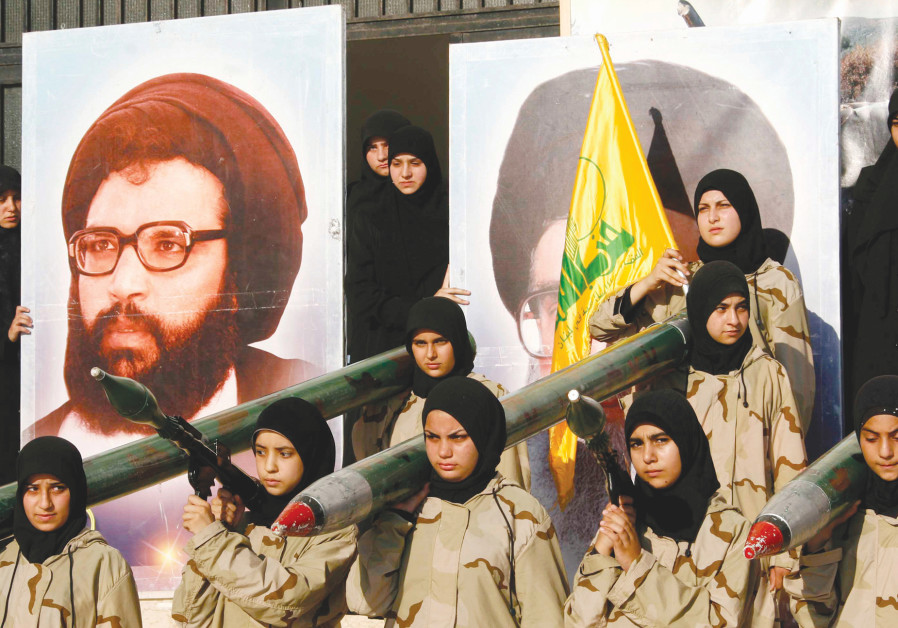Report: Iran sent advanced technology to improve Hezbollah rockets

Iran’s sponsorship of Hezbollah includes $800 million in annual financial support, the supply of 130,000 rockets and missiles. (photo credit: REUTERS)
A Fars Air Qeshm flight Boeing 747 touched down in Beirut at 2:04 pm on October 16. The large white aircraft had left Tehran at 9:33am that morning but had concealed its flight details from international tracking authorities. It stayed in Beirut for almost a day before leaving for Doha on October 17. That plane is now at the center of a report at FoxNews alleging that it carried “GPS devices to make precision-guided weapons in Iranian factories inside Lebanon.”
The report Friday night says that western intelligence sources believe the cargo plane was carrying items for Hezbollah. These components “were bound for these Hezbollah secret sires near the Beirut airport to target Israel in the future.” FoxNews quoted former head of military intelligence Amos Yadlin as saying Israel was determined to confront this kinds of technology transfer. “Israel is determined not to let it happen,” he said. “This is a source of concern because if the Iranians, on the one hand, are determined to build this precision project with ballistic missiles and the Israelis are determined not to let it happen, this is a recipe for collision.”
Fars Air Qeshm’s Boeing 747 has been implicated before in suspicious activity. In September FoxNews also reported that the same plane had departed from an air force base in Tehran on July 9 and also stopped in Damascus before continuing on to Beirut. It also landed in the afternoon. It used the flight number QFZ9960 as opposed to its October number QFZ9950. It also carried out another flight on August 2, leaving Tehran and landing in Beirut. The airline was also fingered in April as one of several being monitored by US intelligence for its role as an air bridge between Tehran and Damascus.
There has been pushback in the past against these reports. Sputnik news, which is close to Moscow’s narrative, argued in September that pushing the “smuggling” story caters to “Washing and Tel Aviv with a pretext to strike Iranian advisors and Hezbollah fighters in Syria.” Israel has carried out over 200 strikes in Syria over the last two years according to a report in September. Prime Minister Benjamin Netanyahu told the UN General Assembly on September 27 that Hezbollah had a number of clandestine sites in Beirut. The IDF released images of a Hezbollah precision missile factory to coincide with the speech. In early October Lebanese residents of Beirut received a WhattsApp message warning them they were licing in close proximity to these sites. “Hezbollah is brazenly lying to the international community,” Netanyahu said, when Lebanon denied the existence of the precision missile factories. He said that Lebanon had not looked underground to reveal Hezbollah’s “underground precision missile production facility.”
Despite the denials, Hezbollah has already admitted it has precision missiles. On September 20 Hezbollah said that “it has been done,” referring to outfitting its missiles with guidance systems. “The resistance now owns precision missile,” Hezbollah leader Hassan Nasrallah said during a speech.
The exposure of the alleged smuggling route and allegations that GPS systems are being put on the ballistic missiles poses a direct threat to Israel. In the past Hezbollah’s missiles have been relatively inaccurate. However the Islamic Revolutionary Guard Corps (IRGC) has increased the accuracy of its own missiles in Iran. In recent months it has showcased this accuracy firing Fateh 110 missiles at Kurdish opposition groups in Iraq in September and fired its Zolfiqar and Qiam ballistic missiles at ISIS in Syria. The attack in Iraq was able to hit a room in a large building, showing the missiles were very precise.
The allegation that Iran has begun to transfer this technology to Lebanon’s Hezbollah is a major escalation and forms part of Hezbollah’s desire to expand its arsenal in the wake of the Syrian civil war winding down. Hezbollah has been devoting resources to fighting in Syria. The last years have seen reports in Syria that Israel has struck weapons convoys destined for Hezbollah. In October Russia deployed the S-300 missile system to Syria. Now Jerusalem has been ramping up accusations about Hezbollah’s weapons systems and how Hezbollah is increasing the precision of its rockets and hiding them beneath Beirut. All of this points to increased tensions between Israel and Lebanon.
Join Jerusalem Post Premium Plus now for just $5 and upgrade your experience with an ads-free website and exclusive content. Click here>>






Comments are closed.